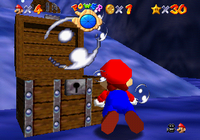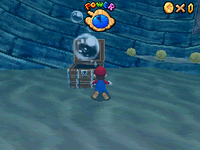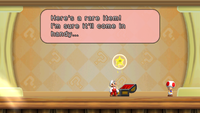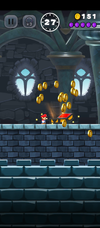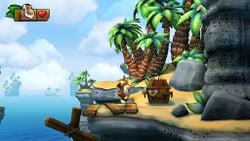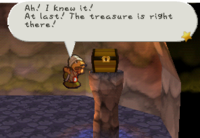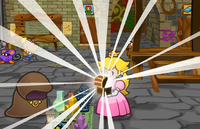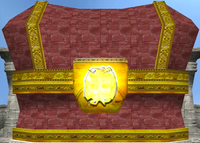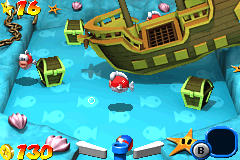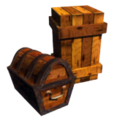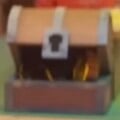Treasure chest
| It has been suggested that this page be split into Treasure chest, Treasure box. (discuss) |
- Not to be confused with Treasure Block.
| Treasure chest | |
|---|---|
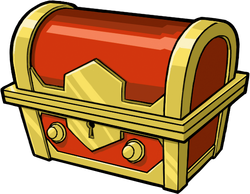 A treasure chest from Wario Land: Shake It! | |
| First appearance | Super Mario Bros. 3 (1988) |
| Latest appearance | Donkey Kong Country Returns HD (2025) |
- “Oh, look at all those treasure chests! You might be able to walk away with some of them if you visit.”
- —Yellow Toad on Goomba Lagoon, Super Mario Party Jamboree
Treasure chests (sometimes formatted as Treasure Chests), also referred to as treasure boxes, appear in the Super Mario franchise as objects located in various areas, usually hidden. Some treasure chests hold the most mundane of items, while others hold unique items needed to complete a quest.
History[edit]
Super Mario series[edit]
Super Mario Bros. 3 / Super Mario Advance 4: Super Mario Bros. 3[edit]
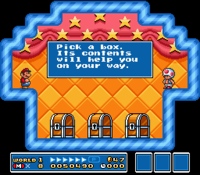
Treasure boxes, referred to simply as "boxes" by a Toad, first appear in Super Mario Bros. 3 and reappear in its reissue. They are usually seen inside Toad's Houses, and when opened, the boxes reveal a power-up that can be used later in the game. Small boxes that also hold useful items appear after the player defeats all of the enemies in an Enemy Course or in secluded areas in levels.
Super Mario 64 / Super Mario 64 DS[edit]
- “I have sunken treasure, here, I do. But to pluck the plunder, you must open the Treasure Chests in the right order.”
- —Sign in Jolly Roger Bay, Super Mario 64
Treasure Chests in Super Mario 64 and Super Mario 64 DS are located in Jolly Roger Bay and Dire, Dire Docks. If a player character touches one of these Treasure Chests in the wrong order, he is shocked and stunned, but if he touches them in the correct order, he receives either bubbles or a Power Star, or causes water to drain.
Super Mario Galaxy[edit]
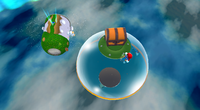
Treasure chests in Super Mario Galaxy contain various items such as coins, Star Bits, a 1-Up Mushroom, or just a bubble, and sometimes something required to progress through the level, such as a Launch Star. Treasure chests can be opened by throwing shells at them. Shiny treasure chests also appear in this game. A Gold Treasure Box appears in the Bigmouth Galaxy and can be opened only by a gold shell. Many chests can be found underwater.
New Super Mario Bros Wii[edit]
Chests in New Super Mario Bros. Wii are what Toads are imprisoned in during an Enemy Course. After the player collects all eight Toad balloons, the chest opens and frees the Toad, who gives Mario three Super Mushrooms as a reward. Chests also appear in Yellow Toad Houses, where they contain a Star.
Super Mario Galaxy 2[edit]
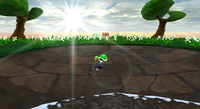
Treasure chests in Super Mario Galaxy 2 serve the same function as in Super Mario Galaxy, but they can additionally be opened using rubbery bulbs.
New Super Mario Bros. 2[edit]
Treasure chests in New Super Mario Bros. 2 appear in Yellow Toad Houses, where they contain a reserve Gold Flower, except in World Star, where a treasure chest gives a reserve Super Star instead.
New Super Mario Bros. U / New Super Luigi U / New Super Mario Bros. U Deluxe[edit]
Chests in New Super Mario Bros. U, New Super Luigi U, and New Super Mario Bros. U Deluxe are located in Enemy Courses, like in Super Mario Bros. 3, but they now contain only a Super Star instead of a Toad. If the player takes too long to collect the Super Star, Nabbit appears and steals it (if the player is playing as Nabbit in New Super Luigi U or New Super Mario Bros. U Deluxe, the screen simply fades to black). Chests also appear behind the end-of-level fortresses when the player completes the level with the last two digits on the timer being the same. A Toad stands behind it and gives what is inside, which is an item corresponding to the last two digits to add to the inventory.
Super Mario Run[edit]
Treasure chests appear in two different contexts in Super Mario Run. When the player completes a world, which means completing the last course of a world, they receive items. This excludes World ★'s Airship Plunder and World 6's Bowser's Bob-ombing Run. In applicable courses, the items that are received are represented in the course by a treasure chest that is opened in a cutscene, and the items themselves are granted in the menu by pop-up. When the player completes World 1's Bowser's Castle Hangout for the first time, a story cutscene overrides the treasure chest's appearance, though the items are still received.
When the player completes an applicable Castle course, the player walks into the room after Fake Bowser's bridge and finds a treasure chest. In an applicable Airship course, a treasure chest appears in the center of the room after the player defeats Boom Boom, and the player character walks up to it. In both cases, the treasure chests open and reveal something. The first time a course is completed, the chest has a Rally Ticket inside, representing the Rally Tickets for completing the world. Later times, the chest spills out coins that fall off the bottom of the screen, representing a 100-coin reward.
Treasure chests appear in the Red Bonus Game House, as the final object in its Bonus Game. The last section of the game has four paths, each of which ends on a treasure chest. When Mario gets close enough, he stops and all the chests open. Three of them have one Rally Ticket, and the last contains three Rally Tickets. However, Mario receives the Rally Ticket(s) only from the chest he ended next to, not all four at once.
Super Mario Odyssey[edit]
Treasure chests in Super Mario Odyssey can contain items such as hearts, Life-Up Hearts, Power Moons, or several coins. They can be opened by throwing Cappy at them or by ground-pounding them. Like in Super Mario 64 and Super Mario 64 DS, some treasure chests must be opened in a certain order. If Mario opens them in the wrong order, instead of him being electrocuted, they disappear and a group of Chinchos appears. Mario must defeat all Chinchos that appear, and the treasure chests reappear for him to try again.
Super Mario Bros. Wonder[edit]
Treasure chests return in Super Mario Bros. Wonder, where they are found in Poplin houses and at the end of KO Arena levels. They contain only badges or Wonder Seeds.
Donkey Kong Country series[edit]
Donkey Kong Country 2: Diddy's Kong Quest[edit]
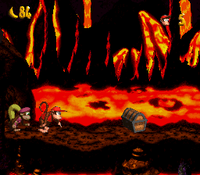
Treasure Chests in Donkey Kong Country 2: Diddy's Kong Quest are colored brown, appear to be made up of wood, and have a dark-gray outline. Some Treasure Chests are darker, a difference only for aesthetic, and this type is usually found in castle levels. Treasure Chests usually contain an item, such as a Banana Bunch, a Red Balloon, a Banana Coin, or even a K-O-N-G Letter. Treasure Chests can be picked up by the player character and thrown at enemies to defeat them, except red Zingers, but the Treasure Chests still break open upon contact regardless. The only Treasure Chests that have to be broken are those with a kannonball, which is required to activate its corresponding kannon to a Bonus Level. In some of the Bonus Levels' "Destroy Them All!" challenges, Treasure Chests have to be used to defeat the enemies. In some "Find the Token!" Bonus Levels, such as Gangplank Galley's first one and Kannon's Klaim's first one, the object is to break the Treasure Chest with the Kremkoin. In the first Bonus Level of Hornet Hole, the Kongs have to hit numerous Zingers with the Treasure Chest until it breaks open and reveals the Kremkoin.
Donkey Kong Country Returns / Donkey Kong Country Returns 3D / Donkey Kong Country: Tropical Freeze[edit]
Treasure chests are given a more minor role in later entries of the Donkey Kong Country series. Though they still contain items of all sorts and values, the treasure chests are immovable and part of the immediate background, just as with every item container from Donkey Kong Country Returns, Donkey Kong Country Returns 3D, and Donkey Kong Country: Tropical Freeze. In these games, treasure chests can be opened by having the ground nearby pounded by the Kongs. In the former two games, they are common item containers on the Beach of Donkey Kong Island. However, treasure chests are not as common in Tropical Freeze, as they can be encountered only in special places, such as on a small bluff in Shoal Atoll, in a stage of Sea Breeze Cove, and on the shipwrecks of Seashore War, a level in the world Donkey Kong Island, which takes place in the Beach world of Donkey Kong Country Returns.
Donkey Kong Land 2[edit]
Treasure Chests in Donkey Kong Land 2 have the same role as in Donkey Kong Country 2: Diddy's Kong Quest.
Super Mario RPG: Legend of the Seven Stars[edit]
Treasure boxes in Super Mario RPG: Legend of the Seven Stars are found hovering in the air, just like ? Blocks, and they must be hit from below. Treasure boxes can contain coins, items, mushrooms, weapons, or monsters. These monsters are a Huhwhat, Whuhoh, Pleaseno, and Comeon. A magic treasure box, created by Wizakoopa after being defeated, is found in the last area of Bowser's Keep, and it contains an infinite number of coins. Hidden Treasures, special invisible treasure boxes, also appear in the game.
Mario Party series[edit]
Mario Party[edit]
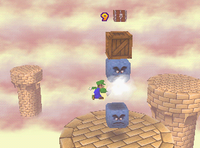
Treasure Chests make various appearances throughout the minigames of Mario Party. One minigame, Buried Treasure, involves players searching for a Treasure Chest. In Slot Machine, lining up three Treasure Chest Marks grants the player 10 Coins.
Mario Party 2[edit]
- Main article: Plunder Chest
A treasure chest appears in Mario Party 2 as a Plunder Chest, which is used to steal an item from another player.
Mario Party 4[edit]
A treasure chest appears in Mario Party 4 within the minigame Team Treasure Trek.
Mario Party 6[edit]
Treasure chests in Mario Party 6 are part of a giant slot machine that looks like a treasure chest on the board Faire Square, where if a player lines up three treasure chests, they win the jackpot. Treasure chests appear in the minigame Treasure Trawlers as the main feature, since players try to grab treasure chests located underwater; regular treasure chests are worth one point, and golden treasure chests are worth three points.
Mario Party 7[edit]
Treasure chests in Mario Party 7 come into play on the board Neon Heights. There are initially three of them in play, spaced out at random spots along the board. One chest contains a Star, another holds 20 coins, and the other houses a Bob-omb. Koopa Kid guards the chests, but he can be bribed into awarding the contents of one in exchange for ten coins. If the Bob-omb is found, the player (or team) will be blown back to the start of the board. If the Star is found, a new chest containing a Star will appear elsewhere on the board. The other two chests will then be shuffled around as well, or added to the board if they have already been claimed. There is also a Bowser Time event exclusive to Neon Heights in which Bowser steals either a Star from the lead player or ten coins from each player, then orders Koopa Kid to stash what was stolen in the chest that already contains either the Star or 20 coins, which can then be recollected by whoever opens the respective chest. There is also the Neon Heights-exclusive Lakitu Orb. Using it triggers Lakitu, who selects a chest at random and brings it to the player, who can open it on the spot without having to pay Koopa Kid. Treasure chests also appear in the single-player Bowser minigame Treasure Dome!, where the player must open each chest by using a key.
Mario Party 8[edit]
In Mario Party 8, on the board Goomba's Booty Boardwalk, Captain Goomba grants Stars from a giant treasure chest to players who reach him at the end of the board. A pair of Goomba idols also grants Stars from a giant treasure chest, but they can be accessed only by riding a Dolphin from the Lucky Space.
Mario Party 9[edit]
Treasure chests in Mario Party 9 appear in bronze, silver, and gold varieties in the minigame Twist Ending.
Wario Land series[edit]
Wario Land 3[edit]
In Wario Land 3, there are four different-colored treasure chests per standard level, and they can be opened for treasure after Wario finds one of four corresponding keys. These treasure chests are as follows: the Gray Chest[1] (or Silver Treasure Chest),[2] Red Chest[1] (or Red Treasure Chest),[3] Blue Chest[1] (or Blue Treasure Chest),[2] and Green Chest[1] (or Green Treasure Chest).[4] After obtaining the appropriate key, Wario can open the chest only if he approaches it from the sides, so he cannot open it if he jumps to the top of it. When Wario approaches a chest to open it, every nearby enemy is eliminated, even bosses and any invincible enemies such as the seeing-eye door.
After the contents of a chest are collected, that chest is replaced with a goal door when the level is revisited.
Wario Land 4[edit]
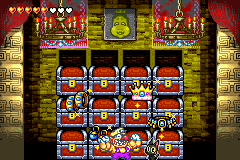
Treasure chests[5] appear in Wario Land 4, where three are found in each of the four main boss rooms, embedded into the wall in the background. During boss battles when time starts to run low (under 1:00 for main bosses, 2:00 for the final boss), the treasure chests in the background begin to disappear one by one. Once Wario defeats the boss, the treasure chests that are left over are collected and stored in the Golden Pyramid on the game's overworld screen. When Wario faces the Golden Diva, the last boss, a maximum of twelve chests can be seen on the background wall.
When the Golden Diva is defeated, the total treasure chests Wario has at the end of the game affect Princess Shokora's appearance in the ending cutscene.
Wario Land: Shake It![edit]
Treasure chests in Wario Land: Shake It! hold one of the levels' three treasures. They can be opened with any attack. However, in Boogie Mansion only, they are replaced by living creatures called Treasure Chomps, which look like big treasure chests but eat Wario if he gets too close to them. Wario must use an explosive to get the treasure inside those living chests.
Paper Mario series[edit]
Paper Mario[edit]
Treasure chests in Paper Mario contain either Badges or Keys. In very big treasure chests, there are weapon upgrades such as the Super Boots and Ultra Hammer. In the west room on the first floor of Boo's Mansion, there is a trap treasure chest that, when opened, causes the chandelier in the room to drop down. In Chapter 4, Kammy Koopa uses her magic to summon several enemies to guard the treasure chests at the end of the first three areas. At the end of Chapter 5, when Mario and Kolorado escape from Mt. Lavalava with Misstar's help, the treasure chest containing the treasure Kolorado is longing for is blowing out by the lava and lands on Jade Jungle, and the player has to retrieve it for Kolorado to proceed in the storyline. There is also a Mysterious Treasure Chest that allows Princess Peach to send Badges, a Shooting Star, and a Jammin' Jelly to Mario.
Paper Mario: The Thousand-Year Door[edit]
Treasure chests in Paper Mario: The Thousand-Year Door have an almost identical function to the previous game. In addition, there is another type of treasure chest called a black chest; all black chests contain beings that "curse" Mario with various abilities. Several Boos appear in a treasure chest in the Creepy Steeple.
There is a treasure chest-like box that Peach is given at the very beginning of the game that contains the Magical Map. She is the only one that can open it because it is said that only one that is "pure of heart" can.
Super Paper Mario[edit]
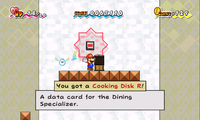
Chests in Super Paper Mario tend to be hidden in places with little accessibility, and to open a chest, the player needs to move the playable character right beside one and press ![]() . Most commonly, Pixls are captured within chests, but players can also find items, cooking ingredients, or Catch Cards in there. In this game, chests adopt a rather abstract design to go along with the game's aesthetics, a design that was also used in Paper Mario: The Thousand-Year Door.
. Most commonly, Pixls are captured within chests, but players can also find items, cooking ingredients, or Catch Cards in there. In this game, chests adopt a rather abstract design to go along with the game's aesthetics, a design that was also used in Paper Mario: The Thousand-Year Door.
Paper Mario: Sticker Star[edit]
Treasure chests in Paper Mario: Sticker Star contain the Tablet Pieces and are paper-thin. Once Mario collects the contents, the chest falls over and cannot be interacted with.
Paper Mario: Color Splash[edit]
Treasure chests in Paper Mario: Color Splash have various contents. A treasure chest appears in the Violet Passage captain's ship, where it contains a member of the blue Rescue Squad and an entry from the legendary captain's journal. A few treasure chests appear on Fortune Island, where one contains a letter from Snifit or Whiffit and another leads to a room below. A treasure chest also appears in the background of Wendy's battle, where she can grab objects from it and throw them at Mario.
Paper Mario: The Origami King[edit]
Treasure chests in Paper Mario: The Origami King commonly appear in the overworld, often containing Collectible Treasures.
Luigi's Mansion series[edit]
Luigi's Mansion[edit]
Treasure chests in Luigi's Mansion and its remake appear after Luigi beats the ghost(s) in a room. Blue Treasure Chests contain keys. Green ones contain many coins, bills, and possibly Gold Bars. If Luigi defeats an optional portrait ghost, he will also receive a green chest with a Blue Diamond inside, among other treasures. Red Treasure Chests contain Mario's dropped Items that need to be taken to Madame Clairvoya. There are many red Treasure Chests in the Hidden Room and Sealed Room as well, though many in the former contain ghosts. A white chest exists in the Tea Room, containing the Ice Element Medal. There are also gold chests revealed after Luigi defeats bosses, and the chests contain area keys.
Luigi's Mansion 3[edit]
Treasure chests in Luigi's Mansion 3 are found throughout the rooms in The Last Resort, often containing treasure such as coins, bills, Gold Bars, and pearls. Some treasure chests are animated by Spirit Balls and turned into hostile Possessed Chests. Luigi must either throw an object into them or have them chew on Gooigi, and then remove the Spirit Balls with the Dark-Light Device, in order to turn them back into regular treasure chests and obtain their contents.
Wario World[edit]
Treasure chests in Wario World each contain one of Wario's 64 treasures. Treasure chests come in eight different colors, and each chest is linked to a treasure button of the same color, which must be activated before the treasure can be collected. There are also wooden chests that contain either coins, garlic, or a bomb when opened. The final boss, the Black Jewel, is locked inside the huge treasure chest (also called the huge treasure box[6] or giant treasure chest[7]), which requires the four pieces of the Huge Treasure Chest Key from the stage bosses.
Mario Pinball Land[edit]
Treasure chests in Mario Pinball Land appear in the underwater area of the Frosty Frontier Stage. There are three in total, and hitting each one grants 2,000 points. The first one hit releases a coin, the second one hit releases two coins, and the last one hit releases three coins in addition to causing the sunken ship to move, allowing Mario inside.
Mario & Luigi: Partners in Time[edit]
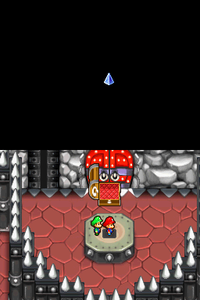
In the past Bowser's Castle in Mario & Luigi: Partners in Time, there is a Treasure Chest Block[8] reminiscent of the treasure boxes from Super Mario RPG: Legend of the Seven Stars near the time hole, containing one of the six Cobalt Star shards. After the chest is hit, however, it disappears.
Wario: Master of Disguise[edit]
Treasure chests in Wario: Master of Disguise are key elements appearing in three colors, each with different contents: red (which hold treasures), green (which hold upgrades such as Guise Gems), and purple (which hold key level items, such as maps and keys). In order to get the treasures in the chest, the player must win a minigame, and the minigames become harder on later levels. Treasure Pests replace one random red chest starting at the third level, requiring the level to be replayed to get that treasure.
Mario Super Sluggers[edit]
Treasure chests in Mario Super Sluggers are located in various spots within the five default parks of Challenge Mode, and they contain special items. Only Wario can open the chests.
Super Smash Bros. for Nintendo 3DS / Wii U[edit]
Treasure chests appear in the Smash Run mode in Super Smash Bros. for Nintendo 3DS, having the same design as the ones that appear in Kid Icarus: Uprising. These chests can contain stat boosts, trophies, gold, powers, and custom parts (either custom special moves or equipment). Mimicuties, fake treasure chest enemies from Kid Icarus: Uprising, also appear as enemies in the Smash Run mode.
Treasure chests in Super Smash Bros. for Wii U appear in the Special Orders mode, with an original design. In Master Orders, a treasure chest appears alongside Master Hand, and it opens and gives the player a reward if they clear the ticket, and disappears if they fail. In Crazy Orders, Crazy Hand drops treasure chests containing random rewards as the player damages him during the final battle; these rewards cannot be seen until after the battle.
Super Nintendo World[edit]
A treasure chest known as Bowser Jr.'s Toy Chest[9] appears in the room in the queue of Bowser Jr. Shadow Showdown in the Super Nintendo World theme park areas. Attendees can hold their Power-Up Bands in front of the chest to obtain the "Toy Chest" stamp.[9]
The Super Mario Bros. Movie[edit]
Treasure chests in The Super Mario Bros. Movie can be seen in the antiques shop in Toad Town.
Princess Peach: Showtime![edit]
Treasure chests in Princess Peach: Showtime! appear only in the Detective Peach stages. They can be opened by Princess Peach investigating them, and they release coins when opened.
Profiles[edit]
Paper Mario[edit]
- Goombario's tattle:
- It's a treasure chest. Let's open it! I've gotta know what's inside there!
- It's a treasure chest. It looks like it's empty.
Paper Mario: The Thousand-Year Door[edit]
- Goombella's tattle:
- This is a treasure chest. What could be inside it?
- This is a treasure chest. It's empty.
- This is a big treasure chest. There must be something amazing inside!
Super Paper Mario[edit]
- Tippi's tattle:
- It's a treasure chest... There's something inside...
- It's a treasure chest, but there's nothing in it anymore...
Gallery[edit]
- For this subject's image gallery, see Gallery:Treasure chest.
Artwork of a Crate and a Treasure Chest in Donkey Kong Country 2: Diddy's Kong Quest
A Super Mario Bros. 3 treasure box sprite from the Super Mario All-Stars version of the game
Screenshot of a treasure chest in The Super Mario Bros. Movie
Names in other languages[edit]
| Language | Name | Meaning | Notes |
|---|---|---|---|
| Japanese | Takara bako / Takaramono bako |
Treasure Chest | |
| Chinese (simplified) | 百宝箱[?] Bǎibǎoxiāng |
- | |
| 宝箱[?] Bǎoxiāng | |||
| Chinese (traditional) | 百寶箱[?] Bǎibǎoxiāng |
- | |
| 寶箱[?] Bǎoxiāng | |||
| Dutch | schatkist[?] | treasure chest | |
| French | Coffre au trésor[?] | Treasure chest | |
| German | Schatzkiste[?] | Treasure box | |
| Schatztruhe[?] | Treasure chest | ||
| Italian | Forziere[11][12][13][14][15][16][17] | Chest | Super Mario Bros. 3, Donkey Kong Country 2: Diddy's Kong Quest, Donkey Kong Land 2, Super Mario RPG: Legend of the Seven Stars, Donkey Kong Country 2, Super Mario Advance 4: Super Mario Bros. 3, Super Mario Galaxy |
| Scatola del tesoro[18] | Treasure box | Super Mario All-Stars | |
| Cassa del tesoro[19] | Treasure chest | Wario Land 3 | |
| Scrigno[20] | Chest | Super Mario RPG (site) | |
| Scrigno del tesoro[?] | Treasure chest | Super Mario RPG (in-game) | |
| Korean | 보물 상자[?] Bomul sangja |
Treasure box | |
| Portuguese (NOA) | Baú de tesouro[?] | Treasure chest | |
| Portuguese (NOE) | Arca do tesouro[?] | Treasure chest | |
| Romanian | Scrin cu comori[?] | Treasure chest | |
| Russian | Сундук с сокровищами[?] Sunduk s sokrovishchami |
Treasure chest | |
| Spanish | cofre de tesoro[?] | treasure chest |
References[edit]
- ^ a b c d June 2000. Nintendo Power Volume 133. Nintendo of America (American English). Page 60.
- ^ a b Official American Wario Land 3 website. Nintendo of America (American English). Archived May 1, 2001, 13:14:10 UTC from the original via Wayback Machine. Retrieved May 25, 2024.
- ^ Official American Wario Land 3 website. Nintendo of America (American English). Archived April 29, 2001, 06:59:08 UTC from the original via Wayback Machine. Retrieved May 25, 2024.
- ^ Official American Wario Land 3 website. Nintendo of America (American English). Archived April 29, 2001, 06:54:50 UTC from the original via Wayback Machine. Retrieved May 25, 2024.
- ^ 2001. Wario Land 4 instruction booklet. Nintendo of America (American English). Page 15.
- ^ 2003. Wario World instruction booklet. Nintendo UK (British English). Page 18.
- ^ 2003. Wario World instruction booklet. Nintendo of America (American English). Page 20.
- ^ "Jump up and hit the Treasure Chest Block in the center of the room to obtain the first Cobalt Star shard and to lower the gate for adult Mario and adult Luigi." – Hoffman, Chris (November 18, 2005). Mario & Luigi: Partners in Time Player's Guide. Nintendo of America (American English). ISBN 1-59812-006-9. Page 21.
- ^ a b Robinson, A. (January 9, 2023). Super Nintendo World Stamps guide: How to unlock all 170 Stamps. Video Games Chronicle. Retrieved January 24, 2023.
- ^ Super Donkey Kong 2: Dixie & Diddy instruction booklet. Nintendo (Japanese). Page 21.
- ^ 1991. Super Mario Bros. 3 instruction booklet. Nintendo of Europe (Italian). Page 16.
- ^ Donkey Kong Country 2: Diddy's Kong Quest instruction booklet. Nintendo of Europe (Italian). Page 17.
- ^ Donkey Kong Land 2 instruction booklet. Nintendo of Europe (Italian). Page 16.
- ^ Super Mario RPG: Legend of the Seven Stars e-manual. Nintendo of Europe (Italian). Page 5.
- ^ Donkey Kong Country 2 instruction booklet. Nintendo of Europe (Italian). Page 113.
- ^ Super Mario Advance 4: Super Mario Bros. 3 instruction booklet. Nintendo of Europe (Italian). Page 110.
- ^ "Colpisci il forziere con un guscio!" – Hint Toad. Super Mario Galaxy. Nintendo of Europe (Italian).
- ^ Super Mario All-Stars instruction booklet. Nintendo of Europe (Italian). Page 32.
- ^ Wario Land 3 instruction booklet. Nintendo of Europe (Italian). Page 107.
- ^ "Trova lo scrigno" – Super Mario RPG (Nintendo Switch) Italian site. Retrieved November 5, 2023.
- Club Nintendo
- Donkey Kong Country 2: Diddy's Kong Quest objects
- Donkey Kong Country Returns objects
- Donkey Kong Country: Tropical Freeze objects
- Luigi's Mansion
- Mario + Rabbids Kingdom Battle
- Mario & Luigi: Partners in Time objects
- Mario Party
- Mario Party 7
- Mario Pinball Land objects
- New Super Mario Bros. 2 objects
- New Super Mario Bros. U objects
- New Super Mario Bros. Wii objects
- Paper Mario objects
- Paper Mario: Color Splash objects
- Paper Mario: The Thousand-Year Door objects
- Paper Mario: The Origami King objects
- Paper Mario: Sticker Star objects
- Super Mario 64 objects
- Super Mario 64 DS objects
- Super Mario Advance 4: Super Mario Bros. 3 objects
- Super Mario Bros. 3 objects
- Super Mario Bros. Wonder objects
- Super Mario Galaxy objects
- Super Mario Galaxy 2 objects
- Super Mario Odyssey objects
- Super Mario RPG: Legend of the Seven Stars objects
- Super Paper Mario objects
- Super Smash Bros. for Nintendo 3DS / Wii U
- Super Smash Bros. series objects
- Wario Land 3 objects
- Wario Land 4 objects
- Wario Land: Shake It! objects
- Wario: Master of Disguise objects
- Wario World objects
- Wario collectibles
